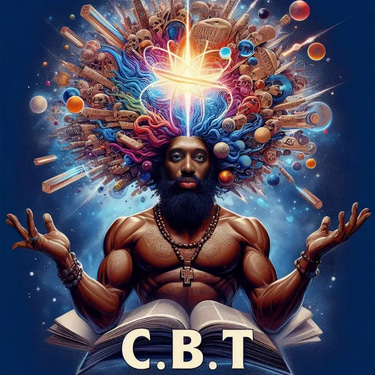Unlocking the Secrets of Creationism: Exploring the Fascinating World of Young Earth Creationism
Dive deep into the captivating realm of young earth creationism as we unravel the mysteries surrounding the origins of our world. This thought-provoking journey explores the intersection of faith and science, examining the controversial perspectives, arguments, and evidence associated with this belief system. Join the conversation and unlock the secrets of our origins by delving into the relationship between faith and science in the context of creationism.
YEC
James Cassel
1/5/20245 min read


Introduction to Creationism
Creationism, a belief that has stirred countless debates and discussions, offers a unique perspective on the origins of our world. In this article, we dive deep into the captivating world of young earth creationism. With a focus on faith and science, we unravel the mysteries surrounding this controversial topic. Join me on this thought-provoking journey as we explore the different arguments, evidence, criticisms, and alternative views associated with young earth creationism.
Understanding Young Earth Creationism
Young earth creationism is a belief system that adheres to the idea that the Earth, as well as the entire universe, was created by a divine being in a relatively short period of time, no more than 10,000 years ago. This perspective is based on a literal interpretation of religious texts, particularly the Bible. According to young earth creationists, the six-day creation account in the book of Genesis provides a comprehensive and accurate explanation of how the world came into existence.
At the core of young earth creationism is the belief that the Earth's age can be calculated by tracing biblical genealogies and adding up the years mentioned in the scriptures. This approach contrasts with the scientific consensus, which supports the theory of an ancient Earth, approximately 4.5 billion years old. Despite this discrepancy, young earth creationists argue that their interpretation is not only valid but also offers a more coherent explanation for the complexity and diversity of life on our planet.
The Debate Between Faith and Science
The relationship between faith and science has long been a contentious topic. Young earth creationism sits at the intersection of these two realms, raising questions about the compatibility of religious beliefs and scientific discoveries. While some argue that faith and science are inherently contradictory, others believe they can coexist harmoniously. This ongoing debate has given rise to a myriad of discussions and has fueled the exploration of alternative interpretations of creation.
For proponents of young earth creationism, faith serves as the foundation of their worldview. They view the Bible as the ultimate authority and rely on it to guide their understanding of the natural world. Science, on the other hand, is often seen as a tool to uncover the intricacies of God's creation. Critics, however, contend that young earth creationism disregards scientific evidence and relies too heavily on religious dogma. Despite these differing viewpoints, the conversation surrounding faith and science continues to evolve and shape our understanding of creationism.
The History of Young Earth Creationism
Young earth creationism has a rich and complex history that spans several centuries. Although the roots of this belief system can be traced back to ancient times, it gained significant momentum in the early 20th century with the rise of fundamentalist Christianity in the United States. Influential figures such as George McCready Price and Henry Morris played pivotal roles in popularizing young earth creationism through their writings and advocacy.
One of the key milestones in the history of young earth creationism is the publication of "The Genesis Flood" in 1961. This book, authored by Henry Morris and John Whitcomb, presented a comprehensive defense of young earth creationism and sparked a renewed interest in the topic. Since then, various organizations and institutions have emerged, dedicated to promoting and defending this perspective. These include Answers in Genesis, the Institute for Creation Research, and Creation Ministries International.
Arguments and Evidence Supporting Young Earth Creationism
Young earth creationism puts forth a range of arguments and evidence in support of its claims. One of the primary arguments centers around the interpretation of the biblical text. Young earth creationists argue that the six-day creation account should be understood as a literal description of the events that unfolded at the dawn of time. They believe that the use of the Hebrew word "yom" (translated as "day") in the book of Genesis unequivocally refers to a 24-hour period.
In addition to linguistic arguments, young earth creationists present scientific evidence that they believe supports their position. This includes challenging the accuracy and reliability of radiometric dating methods, proposing alternative explanations for geological formations, and questioning the assumptions made in evolutionary biology. They argue that these scientific disciplines are influenced by naturalistic biases and fail to provide a comprehensive understanding of the Earth's history.
Criticisms and Challenges to Young Earth Creationism
Despite the passionate arguments put forth by young earth creationists, this belief system has faced its fair share of criticisms and challenges. Many scientists and skeptics argue that the evidence supporting an ancient Earth is overwhelming and cannot be reconciled with a young earth perspective. The scientific community points to a wide range of disciplines, including geology, cosmology, biology, and paleontology, to substantiate their claims about the Earth's age and the processes that have shaped it.
Furthermore, critics argue that young earth creationism relies heavily on cherry-picking and confirmation bias. By selectively interpreting scientific data and dismissing contradictory evidence, young earth creationists are accused of distorting the scientific method. This raises questions about the validity and reliability of their arguments. Additionally, the lack of a cohesive and widely accepted young earth creationist model further weakens its position in the eyes of many scientists.
Exploring Alternative Views and Interpretations
While young earth creationism is one of the most well-known perspectives on the origins of our world, it is not the only interpretation available. Over the years, alternative views have emerged that seek to bridge the gap between faith and science. Old earth creationism, for example, proposes that the six-day creation account should be understood as symbolic or metaphorical rather than literal. This perspective allows for a longer timeline, accommodating scientific evidence of an ancient Earth.
Another perspective, known as theistic evolution, reconciles the concepts of divine creation and evolution. It proposes that God used natural processes to bring about the development of life on Earth. This interpretation seeks to find common ground between religious beliefs and scientific discoveries, acknowledging the compatibility between faith and science.
The Impact of Young Earth Creationism on Society
Young earth creationism has had a significant impact on society, particularly in certain regions and communities. Its influence can be seen in educational systems, where debates over the teaching of creationism in public schools have sparked legal battles and controversy. Some proponents of young earth creationism advocate for the inclusion of their perspective alongside evolutionary theory, arguing for a balanced approach to education.
Additionally, young earth creationism has played a role in shaping public discourse around science, religion, and the nature of truth. It has ignited passionate discussions about the limits of scientific inquiry, the role of faith in society, and the importance of critical thinking. By challenging mainstream scientific consensus, young earth creationism has contributed to a broader conversation about the boundaries of knowledge and the ways in which different belief systems shape our understanding of the world.
Resources for Further Exploration
If you find yourself intrigued by the fascinating world of young earth creationism, there are a multitude of resources available for further exploration. Websites such as Answers in Genesis, the Institute for Creation Research, and Creation Ministries International offer a wealth of articles, books, and multimedia content. These resources provide a comprehensive overview of young earth creationism, allowing you to delve deeper into the arguments, evidence, and counterarguments surrounding this topic.
Additionally, engaging in respectful discussions with individuals who hold different perspectives can broaden your understanding and challenge your own beliefs. Exploring the works of theologians, scientists, and philosophers who have written on the intersection of faith and science can also provide valuable insights and alternative viewpoints. Remember to approach these resources and conversations with an open mind, embracing the opportunity to grow in your understanding of creationism and the diverse perspectives within it.
Conclusion
In conclusion, the world of young earth creationism is a captivating and controversial domain that offers a unique perspective on our origins. By examining the relationship between faith and science, we can better understand the motivations and arguments put forth by young earth creationists. While this belief system has faced criticisms and challenges, it continues to shape public discourse and ignite intellectual curiosity.
As we navigate the complexities of creationism, let us embrace the opportunity to engage in respectful dialogue, explore alternative interpretations, and challenge our own assumptions. By doing so, we can expand our understanding of the world and the diverse perspectives that shape it.
Continue the exploration of creationism and uncover the wonders of our world. Join the conversation and share your thoughts on young earth creationism. Together, let us unlock the secrets of our origins.
